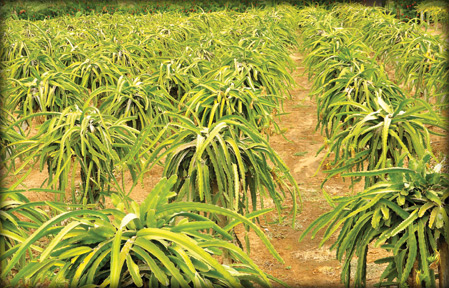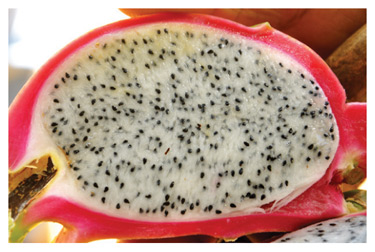Market intelligence vital for successful farming
By Gamini Warushamana
Agriculture has not been a lucrative venture to the farmer community
and we often hear stories of their misery. However, there are some
farmers who are courageous and intelligent enough to overcome this.
 W. Gunapala of Medagama in Kekirawa is one of them. While we were
awaiting him at his farm he arrived in a new Toyota double cab, like a
gem merchant from Ratnapura, contradicting our traditional perception of
farmers. W. Gunapala of Medagama in Kekirawa is one of them. While we were
awaiting him at his farm he arrived in a new Toyota double cab, like a
gem merchant from Ratnapura, contradicting our traditional perception of
farmers.
Medagama is Gunapala's hometown and he belongs to a farmer family.
His parents and grandparents were farmers. He said that farming was not
a profitable venture in the Dry Zone before the completion of the
Mahaweli project.
They were engaged in subsistence agriculture as water was available
only during the Maha season. Their lives changed after they received
water through the implementation of the Mahaweli project in 1979 and,
thereafter, they had sufficient water for cultivation throughout the
year.
"From childhood we engaged in farming and we supported our parents.
My father died when I was 10 and I had to contribute more. On leaving
school after completing my Ordinary Level examination I took to
full-time farming. I had a two-and-a-half acre paddy field and I
cultivated paddy during Yala and Maha seasons," he said.
Paddy farming was not profitable due to marketing issues. During the
harvesting season prices dropped below cost of production. This
situation remains unchanged and is the main challenge farmers face.
Therefore, to help farmers escape from this trap, officials of the
Mahaweli Authority introduced various new crop varieties that were
profitable and which could be cultivated especially during the Yala
season when water is scare, he said.
|

W. Gunapala of Medagama, Kekirawa |
In 1984, big onions were introduced and it was a lucrative business
for farmers and Gunapala was a pioneer who accepted this new crop and he
cultivated big onions until 1996.
In a market economy, super-normal profits cannot be earned forever
because supplies increase when more farmers take to cultivation of the
same type of crop. Big onion farmers too had to face marketing
challenges as a result of cheap imports and lack of government support
at the time.
Responding to market trends, Gunapala shifted to new crops that were
profitable.
"I realised that vegetable cultivation was more profitable and I
shifted to vegetables such as snakegourd, lufa and bittergourd and
earned profits. I cultivated vegetables until 2003," he said.
Gunapala was always a pioneer in introducing new crops and innovative
farming practices. By 2003, there was a big demand for papaya and he
sensed its profitability and shifted to papaya cultivation.
"It was a profitable business and it gave me huge dividends. In 2003,
I started cultivation on one acre and by 2005 I extended it to 10 acres
and by 2006 I had cultivated papaya on 20 acres. I purchased a lorry
with the profits of papaya cultivation," he said.
However, after 2010, papaya cultivation faced various problems such
as viral diseases, low quality imported seed and price drop due to
oversupply.
He then abandoned papaya cultivation and tried out various other
crops such as guava, pomegranate, grapes and banana and he earned a
better income and profit compared to paddy farming.
In 2009, he shifted to dragon fruit cultivation.
 This decision was challenging as this new crop was totally strange to
him as he had never seen the fruit nor had the least idea of how to
cultivate it. This decision was challenging as this new crop was totally strange to
him as he had never seen the fruit nor had the least idea of how to
cultivate it.
The Mahaweli Authority assured him of the feasibility of the
cultivation. "But I had doubts on the market potential because this is
not a familiar fruit in our country and we had never tasted or heard
about it.
"I started with 150 plants. By 2011, I extended it to two-and-a-half
acres," he said.
Dragon fruit has become a highly profitable crop because of high
price and low cost of production.
The crop needs less water and agro chemicals are not used. At the
beginning, marketing was not an issue and Gunapala supplied his total
production to a reputed supermarket chain at Rs. 800 per kg.
However, as supply increased with more farmers taking to dragon fruit
cultivation, the profit margin declined and now the price has dropped to
Rs. 400 per kg. Exporters offer Rs. 250 per kg and they expect the best
quality, he said.
Gunapala is agile in adopting new technology and farming practices.
He has invested on a Israeli drip irrigation system with simple
modification to suit with local conditions such as avoiding issues
related to salinity of water. He said that if farmers can manage their
cultivation properly, farming can be a profitable business.
"I have not learnt about management but I know how to manage my
cultivation. The secret of my success is devotion to work, correct and
timely decision-making and innovative cultivation practices," he said.
|

